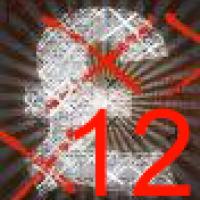
Plus Advent Calendar Door #12: Combinatorics

How likely are you to win the lottery?
In the UK lottery you have to choose 6 numbers out of 49, and for a chance at the jackpot you need all of your 6 numbers to come up in the main draw. So the question is really how many possible combinations of 6 numbers can be drawn out of 49?
There are 49 possibilities for the first number, 48 for the second, and so on, to 44 possibilities for the sixth number, so there are 49 x 48 x 47 x 46 x 45 x 44 = 10068347520 ways of choosing those six numbers... in that order.
But we don't care which order our numbers are picked, and the number of different ways of picking 6 numbers are 6 x 5 x 4 x 3 x 2 x 1 = 6! = 720. Therefore our six numbers are one of 49 x 48 x 47 x 46 x 45 x 44 / 6! = 13983816 so we have about a one in 14 million chance of hitting the jackpot. Hmmm...
But on a brighter note, we have just discovered a very useful mathematical fact: the number of combinations of size $k$ (sets of objects in which order doesn't matter) from a larger set of size $n$ is $$ \frac{n!}{(n-k)!k!}. $$
This sort of argument lies at the heart of combinatorics, the mathematics of counting. It might not help you win lotto, but it might keep you healthy. It is used to understand how viruses such as influenza reproduce and mutate, by assessing the chances of creating viable viruses from random recombination of genetic segments.
You can read more on combinatorics, including money (lotto), love (well kissing frogs) and fun (juggling and rubiks cubes) on Plus.
Return to the Plus advent calendar 2022.
This article is part of our collaboration with the Isaac Newton Institute for Mathematical Sciences (INI), an international research centre and our neighbour here on the University of Cambridge's maths campus. INI attracts leading mathematical scientists from all over the world, and is open to all. Visit www.newton.ac.uk to find out more.
